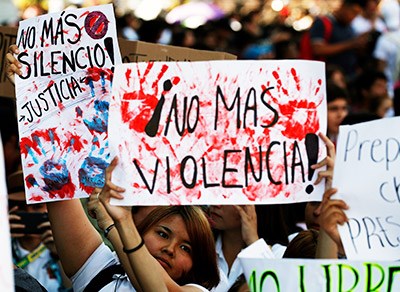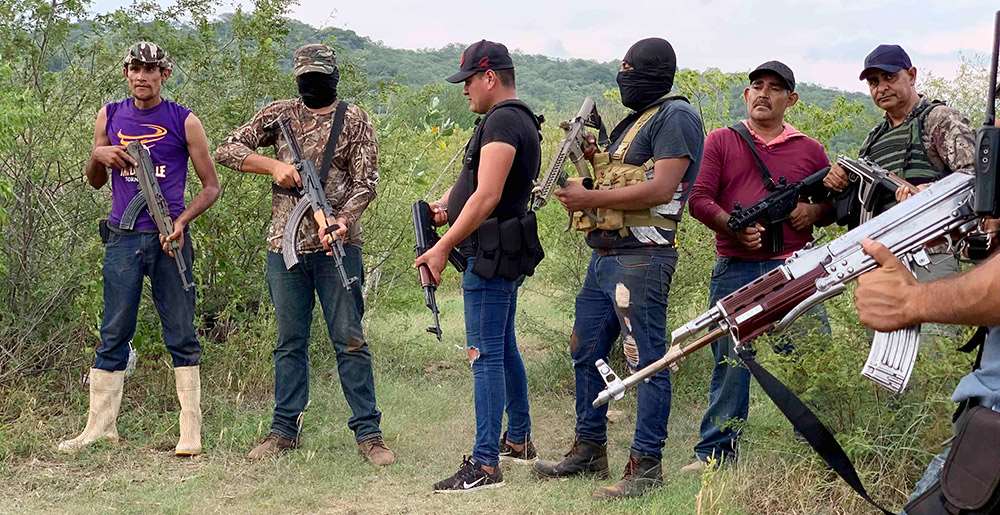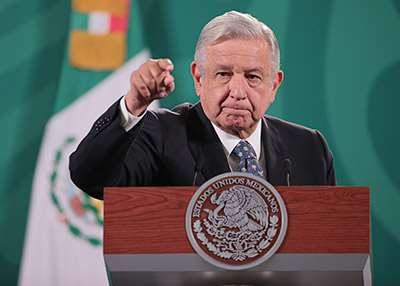
So, a group of Mexican officials, working with a cabal of American gun-control proponents, want to make American gun companies pay billions of dollars because drug cartels are killing each other and others in Mexico.
Perhaps the most-shocking part is that the attempt has not been immediately tossed out of American courts as frivolous.
Earlier this year, a federal appeals court ruled that Mexico could go ahead with its $10 billion lawsuit against several American firearms manufacturers and a distributor. That decision overturned a 2022 dismissal by a U.S. district court which held that Mexico’s allegations were “barred by the Protection of Lawful Commerce in Arms Act” (PLCAA).
 Mexico’s lawsuit, which was initially filed in August 2021, claims that the defendants, including Glock, Colt and Smith & Wesson, “design, market, distribute and sell guns” that arm Mexican cartels and significantly contribute to the country’s rising violence.
Mexico’s lawsuit, which was initially filed in August 2021, claims that the defendants, including Glock, Colt and Smith & Wesson, “design, market, distribute and sell guns” that arm Mexican cartels and significantly contribute to the country’s rising violence.
Mexico’s government applauded the ruling from the three-judge panel in Boston, which asserted that “Mexico’s complaint plausibly alleges a type of claim that is statutorily exempt from the PLCAA’s general prohibition.”
As a refresher, the PLCAA, enacted in 2005, shields firearms manufacturers and dealers from being held liable for crimes committed by third parties with their products. Gun companies can still be held liable for designing and/or manufacturing faulty products. They can also be prosecuted if they break any of the many laws that regulate the manufacture, distribution and sale of firearms. They simply can’t be sued for the actions of a criminal—just as an auto manufacturer can’t be sued if, say, someone uses a vehicle as a weapon.
Of course, Mexico wasn’t the only one celebrating the appeals court’s decision. America’s gun-control groups applauded the ruling; indeed, some American gun-control supporters are helping to push the suit.
The “ruling is a huge step forward in holding the gun industry accountable for its contribution to gun violence, and in stopping the flood of trafficked guns to the cartels,” said Global Action on Gun Violence’s president Jonathan Lowy, who is the Mexican government’s official co-counsel on the case.
Furthermore, in August 2021, Brady, formerly the Brady Campaign Against Gun Violence and, before that, Handgun Control Inc., collaborated with the Mexican government to present the case in the U.S. District Court for the District of Massachusetts. They argued that the U.S. federal court where it was filed should disregard U.S. law, including the U.S. Constitution, and instead rule against the defendants based on Mexican laws. The following year, Lowy and others from the U.S. anti-gun establishment began the Global Action on Gun Violence, and Brady attorneys discreetly registered as agents for Mexico under the Department of Justice’s (DOJ) Foreign Agents Registration Act.
What the anti-gun forces perhaps haven’t factored in—or just don’t care about—is that, should they succeed in having billions of dollars handed to the Mexican government, they wouldn’t be helping Mexico deal with its real problems; it is of course much easier to target legal businesses than it is to tackle the root of the problem: the criminal gangs.
“The Mexican government should focus on bringing the Mexican drug cartels to justice in Mexican courtrooms, not filing a baseless lawsuit in an American court to deflect attention from its disgraceful and corrupt failure to protect its citizens,” stated Larry Keane, senior vice president and general counsel for the National Shooting Sports Foundation (NSSF).
According to Wesley Tabor, a former Drug Enforcement Administration (DEA) special agent who has worked extensively in Mexico and across Latin America, “holding U.S. gun manufacturers responsible for Mexico’s violence isn’t the solution. It’s clear this decision is meant to punish gun manufacturers; any time you see a Justice use language like ‘plausibly alleges,’ you know the fix is in. Gun manufacturers are an easy target because they abide by the law. Like any large corporation in the U.S., they follow the law, hold themselves accountable to the community and interact with legislators. Criminal groups don’t care what laws are on the books; their goal is to make money at any cost. Mexico’s criminally permissive environment is the driving force in these gun crimes, and until that is tempered, no law or civil suit will solve the issue.”
Mexico’s government, and the Bureau of Alcohol, Tobacco, Firearms and Explosives (ATF), claim that between 70 and 90% of firearms recovered in Mexico originate from the United States; however, these figures are based on the number of guns submitted by the Mexican government to U.S. authorities that could be successfully traced, and not the total number of guns the Mexican government seized.
Even the Government Accountability Office (GAO) recently cast doubt on the ATF data that supposedly indicates that a large portion of Mexico’s illegal guns come from north of the border. According to a 2021 report, “ATF’s data only shows part of the picture” when it comes to reporting on guns recovered in Mexico and traced to U.S. sources.

“For example, data reported by the Mexican Attorney General may not include guns recovered by other Mexican agencies,” the report noted. The “ATF does not receive complete data about thousands of firearms, such as those recovered by Mexican states, because only Mexico’s federal Attorney General’s office submits trace requests to ATF.”
The report highlighted that U.S. Immigration and Customs Enforcement (ICE), U.S. Customs and Border Protection (CBP) and the U.S. State Department have established joint operations and working groups with the Mexican government to disrupt weapons trafficking, but found that “none of the agencies have fully developed performance measures for their efforts to disrupt firearms trafficking to Mexico, and thus they have limited ability to assess progress.”
Whatever the number of U.S. guns that do end up south of the border might be, during the Obama administration, the ATF had a large part to play. From 2009-2011, the ATF’s “Operation Fast and Furious,” run out of the bureau’s Phoenix Field Division—and overseen by the DOJ—facilitated illicit gun sales in a thoughtless effort to trace the sellers and buyers with suspected cartel ties. That’s right, the Obama-era U.S. government pledged to implement gun-control measures on law-abiding Americans while at the same time arming drug cartels in a neighboring nation.
Not surprisingly, the American government lost track of most of the firearms, which were then used for an unknown number of violent crimes and believed to have been used in gang-on-gang shootouts. In late 2010, two firearms supplied as part of the operation were found at the location where a U.S. Border Patrol agent was murdered. We still don’t even know the full extent of the carnage. In 2012, Republicans on the House Oversight Committee recommended then-Attorney General Eric Holder (D) be cited for contempt of Congress for refusing to disclose key documents related to Operation Fast and Furious.
Thus, to blame American gun makers for Mexico’s violence is about as far-fetched as it comes. Mexico is a country rife with corruption. It is a country where police and military forces typically avoid confrontation and/or collude with the cartels and drug gangs; as a result, the bloodshed in Mexico has continued. The U.S. State Department warns that “homicide, kidnapping, carjacking and robbery are widespread and common in Mexico.” It warns Americans not to travel to at least six states and to “reconsider” travel to an additional seven. Furthermore, the United Nations High Commissioner for Refugees reports that Mexico’s murder rate stands at 16.9 per 100,000 inhabitants, ranking it as the 15th highest globally and seven times higher than that of the United States.
Even the leading strategic forecasting company Stratfor pokes holes in the lawsuit’s figures, which they claim emanated from a June 2009 GAO report to Congress on U.S. efforts to combat arms trafficking to Mexico.

“The 3,480 guns positively traced to the United States equals less than 12% of the total arms seized in Mexico in 2008 and less than 48% of all those submitted by the Mexican government to the ATF for tracing,” Stratfor’s intelligence report noted. “This means that almost 90% of the guns seized in Mexico in 2008 were not traced back to the United States. The remaining 22,800 firearms seized by Mexican authorities in 2008 were not traced for a variety of reasons. In addition to factors such as bureaucratic barriers and negligence, many of the weapons seized by Mexican authorities either do not bear serial numbers or have had their serial numbers altered or obliterated.”
It’s important to note that Mexican authorities frequently refrain from sending certain types of firearms to the ATF for tracing purposes. These firearms include those identified as coming from their own military or police units, as well as guns they can trace independently to sales through the Mexican Defense Department’s Arms and Ammunition Marketing Division.
While owning a firearm lawfully is not impossible, and the right to bear arms is at least ceremonially enshrined in Mexico’s constitution, doing so is an arduous and complicated process consisting of long wait times and background checks. Applicants must have a job, a crime-free record and have served in the military. Only a dozen or so licenses are typically granted to ordinary citizens annually. Those applying for personal-defense reasons are only permitted to own a handgun, and anything beyond a .38 caliber is prohibited.
To complicate matters further for those Mexican citizens who are fortunate enough to be given permission to own a firearm, there is only one legal gun store in the entire country, located in Mexico City on a military base.
So, where does Mexico really get its guns then?
A prominent portion of Mexico’s crime guns are stolen in Mexico from their authorized owners or purchased via a straw purchase from corrupt officials or law-enforcement or military members. In addition, the cartels are widely known to use improvised explosive devices (IEDs) with commercially sold Tovex. Cartels also have belt-fed machine guns, rocket launchers, bomb-dropping drones and grenades.
Additionally, cartels have tapped into the international arms market—reports from private Mexico intelligence firms suggest that the illegal arms trade increasingly points across the Pacific to China. The cartels are broadly known to rely on illicit Chinese enterprises for precursor chemicals to produce deadly narcotics like fentanyl, so setting up arms deals is hardly a leap. As Stratfor points out, “items, such as South Korean fragmentation grenades and RPG-7s, often used by the cartels, simply are not in the U.S. arsenal.”

Several former leading Mexican law-enforcement and intel officials, speaking on the condition of anonymity, pointed out that more and more firearms are being unlawfully manufactured within Mexico’s own borders or are coming from a range of other countries.
“Many come from other parts of Latin America, Eastern Europe and China,” one source said.
Another high-ranking official said that cartels typically buy firearms in bulk and are well-connected to black markets spanning from Nicaragua to Asia to the Middle East.
“Cartels have established trafficking routes from Central and Latin America. Remember, Latin America is awash with illegal weapons,” a third source emphasized. “Cartels love LAW [light anti-tank weapon] rockets and M60 machine guns. These are not coming from the United States.”
Since taking office, Mexico’s President Andrés Manuel López Obrador has had a cringe-worthy “hugs, not bullets” approach to fighting the drug trade. He has avoided encounters with the cartels at almost every level. Meanwhile, the Biden administration has refused to condemn López Obrador’s policies.
Even as Mexico blames America’s gun companies for cartel violence, the impact of the drug trade on Americans has never been more destructive. Fentanyl, which is produced in and smuggled in from Mexico, claims more than 150 lives every single day in the U.S., according to the Centers for Disease Control and Prevention (CDC). It is essentially trench warfare, and yet the American gun-control lobby is actively working to ensure Mexico successfully extracts $10 billion from lawful U.S. businesses.
“If the $10 billion were to be awarded, the money would never go to the citizens or victims,” said Tabor. “Some would surely go to cartel leaders.”
“The U.S. Court of Appeals for the First Circuit, known for its liberal stance on most issues, clearly took the trajectory of opposition to the gun manufacturers’ rights to utilize domestic and international commerce. Legally sourced guns and their transfer to other countries is controlled by U.S. and Mexico import and export law,” said Tabor. “We are talking about illegally sourced guns; how can the U.S. legal system hold any company liable for someone’s illegal use of their product? It just doesn’t make sense.”


































